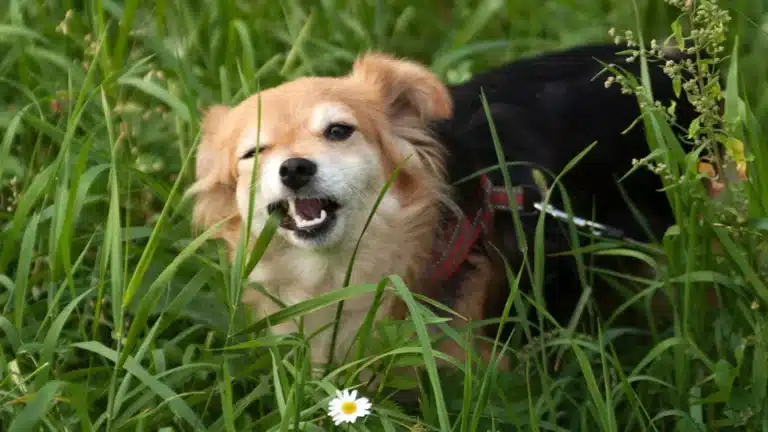Why Do Dogs Eat Grass?
If you’re a dog owner, chances are you’ve witnessed your dog happily munching away at a patch of grass like a miniature cow. Dogs are curious creatures, and sometimes their behaviour can be puzzling. While it may seem strange and even concerning, there are several reasons why dogs may eat grass.

The Many Views About Grass-Eating Behavior
Over the years, experts have proposed numerous theories to explain why dogs eat grass. Dogs can’t exactly sit down and tell us their reasons (though wouldn’t that be amazing?), so researchers have had to rely on observation and studies of canine behaviour. While there’s no one-size-fits-all explanation that everyone agrees on, there are a few interesting theories that really stand out:
Instincts Passed Down From Wild Canines
To understand modern dog behaviour, it helps to look at where dogs come from. Dogs are descendants of wild canines, such as wolves and foxes, who had to hunt for their food. Unlike our pampered pets, wild canines didn’t have access to neatly packaged kibble. When wolves catch prey, they often consume the entire animal—meat, bones, and stomach contents.
Interestingly, the stomachs of herbivorous prey animals (like rabbits, deer, and rodents) often contained various plant materials. By eating their prey whole, wolves unintentionally ingested vegetation like grass, leaves, and berries. Over time, this diet may have contributed to a natural instinct in dogs to occasionally seek out plant material, even when they don’t need it.
Some experts believe that modern dogs are still hardwired to crave greenery occasionally as part of their ancestral instincts. Though dogs today don’t rely on hunting for survival, their evolutionary past may still shape their behaviours.
Digestive Issues
One of the most widely believed theories is that dogs eat grass to induce vomiting when they feel unwell. You might have heard other pet owners say, “My dog eats grass whenever they have an upset stomach.”
The idea is that rough or fibrous grass can irritate the stomach lining, triggering vomiting and helping a dog purge whatever might be causing discomfort. Indeed, some dogs will eat grass and then throw up shortly afterward, seemingly feeling better afterward. However, studies have shown that most dogs eating grass don’t vomit. In fact, many dogs display no signs of feeling ill before or after grazing.
This suggests that while some dogs may use grass to soothe digestive issues, it’s not the sole reason behind the behaviour. If your dog occasionally eats grass and vomits but otherwise seems healthy, it’s likely nothing to worry about. However, if vomiting becomes frequent or is accompanied by other symptoms (such as lethargy, diarrhea, or loss of appetite), you should consult a veterinarian.
Nutritional deficiencies
Another potential explanation is that dogs eat grass to make up for nutritional deficiencies, particularly when it comes to fibre. Fiber plays an important role in maintaining healthy digestion. It helps regulate bowel movements, supports beneficial gut bacteria, and can prevent constipation.
Even though most commercial dog foods are designed to be nutritionally complete, not all brands provide the same level of quality. Some low-grade dog foods may lack adequate fibre or nutrients, leaving dogs craving extra roughage.
Add more high-fiber, dog-safe foods to your pet’s meals to test whether diet is a factor. Vegetables like carrots, sweet potatoes, and green beans are healthy options that many dogs enjoy. Suppose your dog’s grass eating habit decreases after dietary changes. In that case, it may have been a sign that they all needed more fibre.
Curiosity, Boredom, or a Need for Mental Stimulation
Let’s be honest, dogs are naturally curious creatures who love to explore the world with their mouths. Just as a bored or curious dog might chew on shoes, sticks, or furniture, they might also turn to grass when looking for something to do.
This behaviour is especially common in younger dogs and high-energy breeds that require a lot of physical and mental stimulation. When dogs are left alone for extended time or lack mental stimulation, they may get bored or anxious, leading to behaviours such as grass-eating as a coping mechanism or a way to alleviate stress.
To ensure your dog gets enough exercise, offer them daily running, playing, and exploring opportunities. This could be taking them for walks, playing games like fetch or tug-of-war, or giving them space to roam in a secure yard. If you don’t have the time, enrolling them in daycare or hiring a dog walker can be a great option.
They Like the Taste or Texture
Sometimes, the simplest explanation is correct: your dog might enjoy the taste or texture of grass! Dogs, like humans, have individual preferences. Just as some people crave salty snacks while others prefer sweet treats, dogs may develop a taste for the earthy flavour or crunchy feel of grass.
If your dog consistently seeks out certain types of grass or returns to the same spot to graze, it’s possible they’ve found a variety they particularly enjoy. As long as the behavior isn’t excessive and the grass is free from pesticides and other harmful chemicals, there’s no harm in letting them indulge occasionally.
Is Grass-Eating Dangerous for Dogs?
In most cases, grass-eating is harmless. However, there are a few potential risks to be aware of:
- Exposure to Chemicals: Grass treated with pesticides, herbicides, or fertilizers can be very harmful to dogs. Ensure your pet does not graze on treated lawns or public parks where chemicals have been applied.
- Toxic Plants: Some plants commonly found in yards and gardens are poisonous to dogs. Ensure your outdoor space is free from harmful plants like azaleas, lilies, and foxgloves.
- Digestive Blockages: Though uncommon, long blades of grass or large quantities of plant material can lead to digestive blockages, especially if your dog swallows without chewing properly.
When Should You Be Concerned?
Although occasional grass-eating is normal, there are some red flags that may indicate a larger problem.
- Frequent Vomiting: Regular vomiting after eating grass may point to chronic gastrointestinal issues.
- Loss of Appetite: if your dog stop eating their usual food and continues to eat grass, it could indicate he/she is not feeling well or have some type of illness.
- Lethargy: A sudden loss in energy levels could be a sign of a health condition.
- Diarrhea: Constant diarrhea alongside grass eating may need medical attention.
Tips for Managing Grass Eating
If your dog’s grass eating habit becomes a problem, here are a few ideas to help:
- Provide a Balanced Diet: Ensure your dog is getting all the necessary nutrients and fibre from their regular meals.
- Offer Alternatives: Introduce safe, dog-friendly veggies like cucumbers, carrots, or spinach as a healthy substitute for grass. You can also purchase edible pet grass from pet stores.
- Supervise Outdoor Time: Keep a close eye on your dog when they’re outside, especially if you know there are treated lawns or toxic plants nearby.
- Exercise and Mental Stimulation: Make sure your dog is getting enough physical activity and mental enrichment to prevent boredom-related behaviours.
Dogs have so many funny quirks, and one of the most interesting is their habit of nibbling on grass! There are a few reasons why they do this, but the good news is that it’s usually harmless. Whether they’re following their instincts, trying to meet some dietary needs, or just exploring out of curiosity, munching on grass is a totally natural behavior for many dogs.
By understanding your dog and keeping an eye out for potential risks, you can help them stay happy, healthy, and safe. The next time your dog chomps on a blade of grass, you can smile, knowing that it’s likely just one of their many adorable—and occasionally mysterious—habits.
